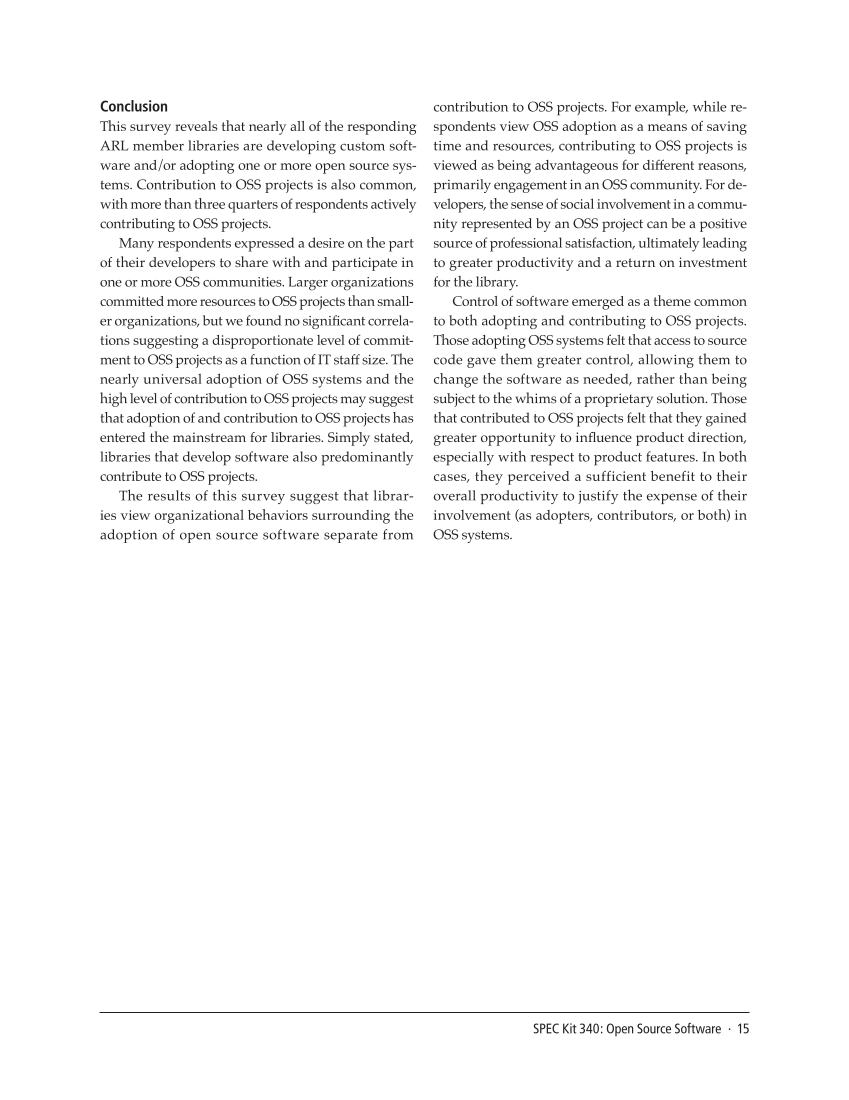SPEC Kit 340: Open Source Software · 15
Conclusion
This survey reveals that nearly all of the responding
ARL member libraries are developing custom soft-
ware and/or adopting one or more open source sys-
tems. Contribution to OSS projects is also common,
with more than three quarters of respondents actively
contributing to OSS projects.
Many respondents expressed a desire on the part
of their developers to share with and participate in
one or more OSS communities. Larger organizations
committed more resources to OSS projects than small-
er organizations, but we found no significant correla-
tions suggesting a disproportionate level of commit-
ment to OSS projects as a function of IT staff size. The
nearly universal adoption of OSS systems and the
high level of contribution to OSS projects may suggest
that adoption of and contribution to OSS projects has
entered the mainstream for libraries. Simply stated,
libraries that develop software also predominantly
contribute to OSS projects.
The results of this survey suggest that librar-
ies view organizational behaviors surrounding the
adoption of open source software separate from
contribution to OSS projects. For example, while re-
spondents view OSS adoption as a means of saving
time and resources, contributing to OSS projects is
viewed as being advantageous for different reasons,
primarily engagement in an OSS community. For de-
velopers, the sense of social involvement in a commu-
nity represented by an OSS project can be a positive
source of professional satisfaction, ultimately leading
to greater productivity and a return on investment
for the library.
Control of software emerged as a theme common
to both adopting and contributing to OSS projects.
Those adopting OSS systems felt that access to source
code gave them greater control, allowing them to
change the software as needed, rather than being
subject to the whims of a proprietary solution. Those
that contributed to OSS projects felt that they gained
greater opportunity to influence product direction,
especially with respect to product features. In both
cases, they perceived a sufficient benefit to their
overall productivity to justify the expense of their
involvement (as adopters, contributors, or both) in
OSS systems.
Conclusion
This survey reveals that nearly all of the responding
ARL member libraries are developing custom soft-
ware and/or adopting one or more open source sys-
tems. Contribution to OSS projects is also common,
with more than three quarters of respondents actively
contributing to OSS projects.
Many respondents expressed a desire on the part
of their developers to share with and participate in
one or more OSS communities. Larger organizations
committed more resources to OSS projects than small-
er organizations, but we found no significant correla-
tions suggesting a disproportionate level of commit-
ment to OSS projects as a function of IT staff size. The
nearly universal adoption of OSS systems and the
high level of contribution to OSS projects may suggest
that adoption of and contribution to OSS projects has
entered the mainstream for libraries. Simply stated,
libraries that develop software also predominantly
contribute to OSS projects.
The results of this survey suggest that librar-
ies view organizational behaviors surrounding the
adoption of open source software separate from
contribution to OSS projects. For example, while re-
spondents view OSS adoption as a means of saving
time and resources, contributing to OSS projects is
viewed as being advantageous for different reasons,
primarily engagement in an OSS community. For de-
velopers, the sense of social involvement in a commu-
nity represented by an OSS project can be a positive
source of professional satisfaction, ultimately leading
to greater productivity and a return on investment
for the library.
Control of software emerged as a theme common
to both adopting and contributing to OSS projects.
Those adopting OSS systems felt that access to source
code gave them greater control, allowing them to
change the software as needed, rather than being
subject to the whims of a proprietary solution. Those
that contributed to OSS projects felt that they gained
greater opportunity to influence product direction,
especially with respect to product features. In both
cases, they perceived a sufficient benefit to their
overall productivity to justify the expense of their
involvement (as adopters, contributors, or both) in
OSS systems.
























































































































































































